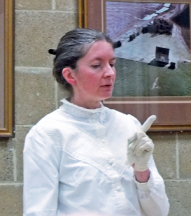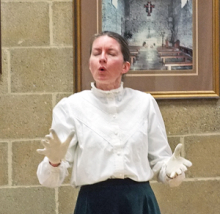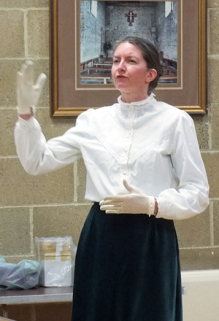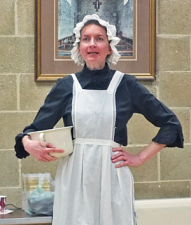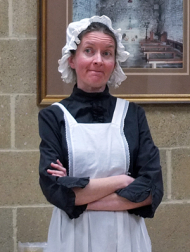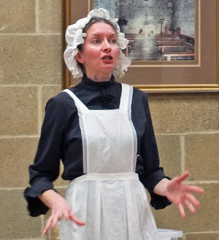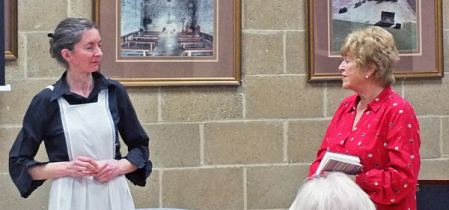MARCH 2019 MEETING REPORT
A PRESENTATION by Debra John from Swansea
who brings to life TALES FROM WALES
and an EDWARDIAN MAID
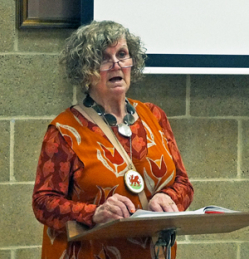
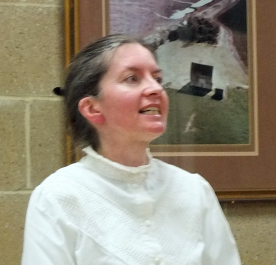
The Society was pleased to welcome freelance actress and storyteller Debra John to its March 2019 meeting. Debra was born and brought up in Swansea, studied Drama and English at Aberystwyth University and achieved a Postgraduate Certificate in Education. Debra specialises in period costume character performances giving educational insight into the heritage of Wales and is perhaps best known for her roles in “The Story of Wales” and “Mamwlad”; in the latter of these, Debra played Amy Dillwyn, a role that she performed in the presence of Her Majesty the Queen and Prince Philip.
Debra’s first half performance comprised five mythological tales being told to a young boy by an old woman:-
The first of these tales revolved around the misadventures of a Bat, a Bramble and a Cormorant. (As with so many tales the original source of this one is shrouded in the mists of time, a version being attributed at least as far back as Aesop, who, being a Greek fabulist born in the 7th Century BC (BCE) had, as far as we know no direct connection with Wales!). The Bat and the Bramble unwisely invest in a money-making scheme dreamt up by the Cormorant to ship goods over the seas. The ship is lost in a storm and sinks to the bottom of the sea leaving the cormorant to dive from cliffs to the seabed to trace the wreck of the ship its contents, the bat to live in the darkness to avoid its creditors and the bramble to snare the clothes of unwary passers-by so as to recoup its stock of wool that was lost when the ship foundered.
In the second tale Megan, a maid, moves with all of her belongings inland from Aberystwyth and is separated by a river from her most valued possession, her milk cow. She is accosted by a phantasmagorical monk who builds a bridge across the river to reunite the two. Unlike the Severn Bridge (and in the true spirit of mythological tales) passage over this bridge still requires the payment of a toll – on this occasion the right of the monk to ownership of the first living thing to cross the bridge. Megan manages to outwit the scheming monk by rolling a loaf of bread over the bridge to be eagerly pursued by her dog. The monk disappears leaving Megan to be reacquainted with her cow. For those members wishing to visit the site of this terrifying incident the bridge is now conveniently known as Devil’s Bridge.
Debra’s third tale centred around the stay of a wizard, Huw Lloyd, at an unfrequented inn near Betws-y-Coed – the two sisters running the inn being deprived of their custom by a series of mysterious robberies from previous guests. During the night an attempt is made on Huw’s possessions by two cats that enter his room via the chimney. Huw fights off the cats, cutting the wrist of one of them with his sword, and they flee back up the chimney. Assuming that the cats have been deterred from further larcenous activity Huw settles his bill observing that one of the sisters has a bandage around her wrist and so, realising that the sisters are witches who adopt the guise of cats, draws blood from the other thus removing the spell from both of them.
The fourth tale, contained in the Mabinogion, follows Prince Pwyll of Dyfed who, whilst out hunting, ascends a magical mound that will either show him a marvel or deal him a blow. The maid Rhiannon appears to him and, after a long pursuit on horseback by Pwyll, explains that she has sought him out to marry him in preference to her current betrothed, Gwawl. A disguised Gwawl attends their wedding feast and tricks Pwyll into granting Gwawl the hand of Rhiannon. Rhiannon instructs Pwyll to attend her wedding dressed as a beggar and request Gwawl to fill a 'small bag' with food. She has enchanted the 'small bag' so it cannot ever be filled and Gwawl is persuaded to step into it to control its magic. Pwyll traps him in the bag which his men beat and kick forcing Gwawl to relinquish Rhiannon and extract no revenge for the incident. Rhiannon marries Pwyll then journeys to Dyfed as its queen.
In the fifth and final tale a clever boy named Tangwyn is given permission to leave home by his father who cautions him that he should always listen to the words of a preacher. Tangwyn is eventually offered the job of House Steward to a rich nobleman however he is so popular in the household that the nobleman becomes envious of him and a plot is hatched to kill him. Tangwyn is asked to take a pitcher of beer to the lime workers on the estate little knowing that they had been instructed to kill the first man they see walking across the meadow towards them. Tangwyn sets out on his fateful journey only to hear a preacher calling to him and, mindful of his promise to his father, deviates from his task. The nobleman, thinking that his instructions had been carried out, sets out across the meadow with another pitcher of beer to thank the lime workers. The conclusion to this tale is immediately apparent!
Following refreshments and the raffle Debra returned in the costume of an Upper Housemaid in a grand Edwardian household and, in character, gave us a description of her duties in the household, weaving in various candid comments about her employers, other grand households and the servants around her (both above and below, bringing to mind the famous comedy sketch “I know my place”). Debra brought to life wonderfully and with considerable humour the life of domestic servitude made familiar to most of us by TV shows such as “Upstairs Downstairs” and (slightly less realistically) “Downton Abbey” and by books such as Margaret Powell’s “Below Stairs”.
It is to be hoped that another visit from Debra can be arranged in the future.
